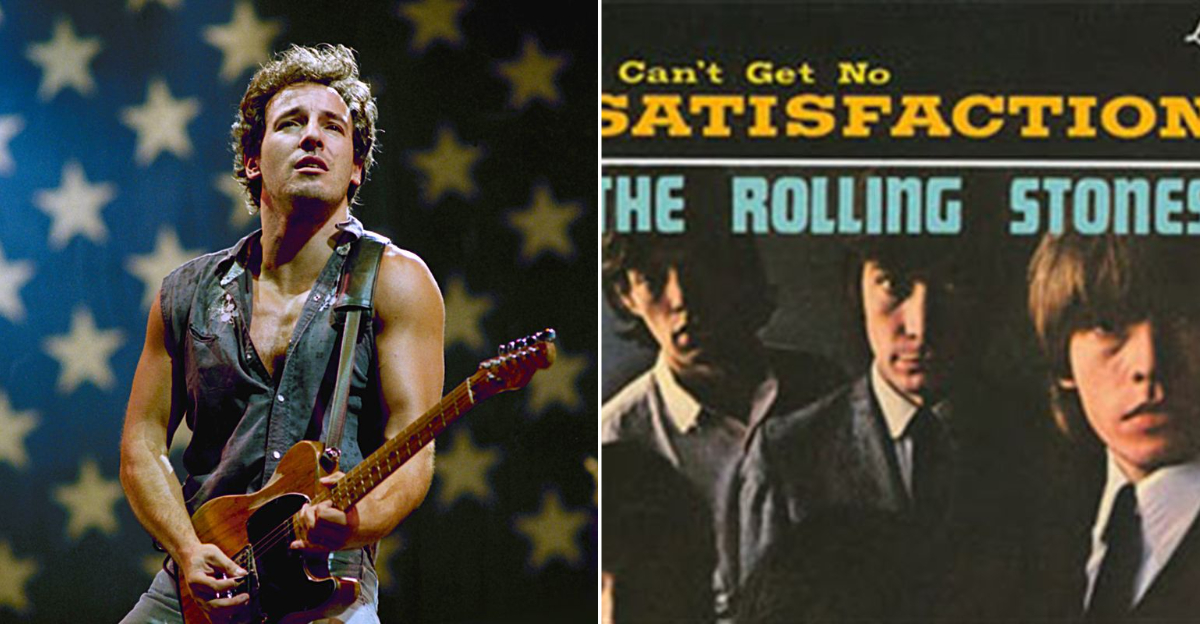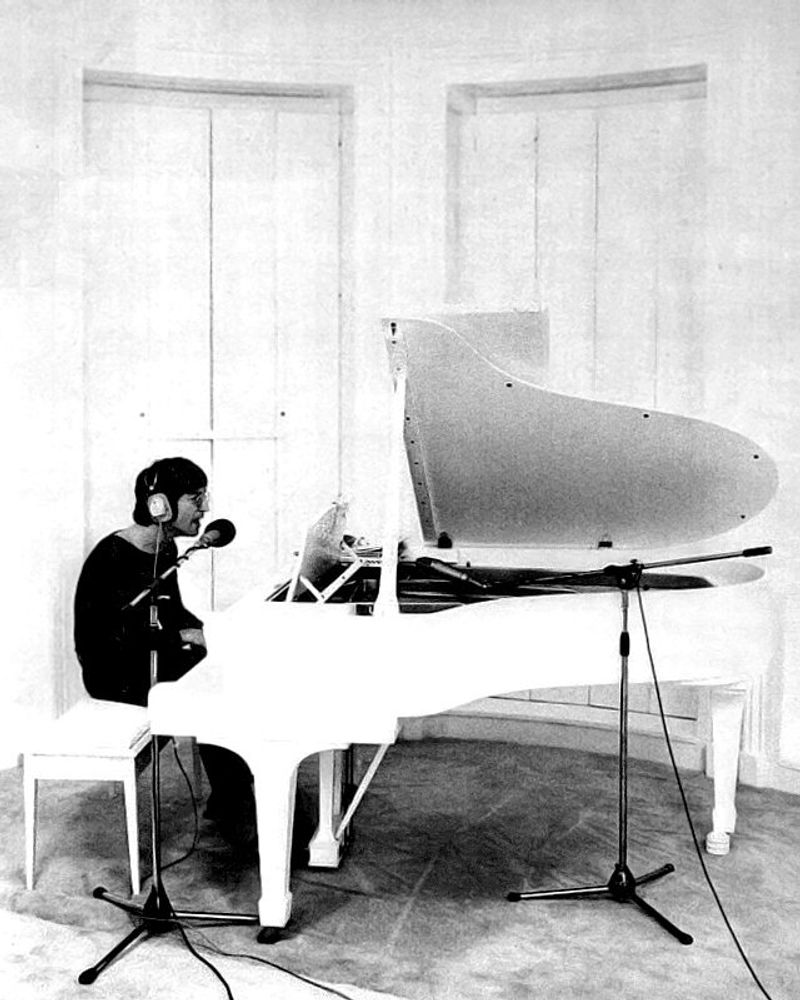Throughout the history of music, there have been songs that sparked controversy, pushing the boundaries of societal norms and challenging the status quo.
These songs often faced bans, censorship, and backlash from various groups, yet they continued to resonate with audiences, leaving a mark on the cultural landscape.
In this blog post, we explore twenty such songs that the world tried to erase but could never truly silence.
1. “Imagine” by John Lennon
John Lennon’s “Imagine” is often celebrated as an anthem for peace, yet its radical ideas have stirred controversy. The song invites listeners to envision a world without borders and religions, which some saw as a threat to traditional values.
Despite this, “Imagine” remains a timeless piece, urging society to dream of a harmonious future. The ethereal melody paired with profound lyrics continues to inspire hope across generations.
2. “Like a Prayer” by Madonna
Madonna’s “Like a Prayer” pushed boundaries with its provocative music video that included religious imagery and themes of racial harmony.
The juxtaposition of sacred symbols with pop culture sparked outrage, leading to calls for boycotts from religious groups. Yet, the song’s powerful message about faith and unity prevailed, cementing its place in pop history.
3. “Smack My B*tch Up” by The Prodigy
The Prodigy’s “Smack My B*tch Up” drew criticism for its aggressive title and content. Many interpreted it as an endorsement of violence against women, though the band claimed it was about ‘doing anything intensely.’
The song was banned by several radio stations, yet its high-energy beat captured the essence of the rave scene, leaving its mark on electronic music.
4. “Cop Killer” by Body Count
Body Count’s “Cop Killer,” fronted by Ice-T, became a lightning rod for controversy with its raw portrayal of police brutality. Authorities and political figures called for its ban, citing it as inflammatory.
Nonetheless, the song highlighted crucial conversations about systemic injustice and the role of art in activism.
5. “(I Can’t Get No) Satisfaction” by The Rolling Stones
The Rolling Stones’ “(I Can’t Get No) Satisfaction” was revolutionary with its gritty sound and rebellious lyrics, challenging societal norms of the 1960s.
Although criticized for its perceived sexual connotations, the song became an anthem of youthful defiance and the counterculture movement, symbolizing the spirit of a generation yearning for change.
6. “Lola” by The Kinks
The Kinks’ “Lola” tells a tale of a romantic encounter with a twist, addressing themes of gender identity. It faced backlash due to its subject matter, yet it broke barriers, fostering acceptance and understanding.
The catchy tune and clever storytelling continue to resonate, making “Lola” a timeless classic that challenges societal norms.
7. “God Save the Queen” by Sex Pistols
The Sex Pistols’ “God Save the Queen” became notorious for its scathing critique of the British monarchy. Released during the Queen’s Silver Jubilee, it was perceived as unpatriotic and disrespectful, leading to its ban by the BBC.
Despite this, the song’s rebellious spirit captured the essence of the punk rock movement, embodying a generation’s disillusionment with authority.
8. “Blurred Lines” by Robin Thicke
Robin Thicke’s “Blurred Lines” was a chart-topping hit that sparked debate over its controversial lyrics and music video. Critics argued that it blurred the lines of consent, promoting misogyny.
Despite its catchy beat and commercial success, the song faced boycotts and legal battles, reflecting ongoing discussions about gender equality and artistic responsibility.
9. “Born in the U.S.A.” by Bruce Springsteen
Bruce Springsteen’s “Born in the U.S.A.” is often mistaken for a patriotic anthem, yet its lyrics criticize the treatment of Vietnam veterans. The song’s misunderstood message led to its appropriation by political figures, sparking debate.
Its driving beat and poignant storytelling continue to resonate, highlighting the complexities of American identity.
10. “Money for Nothing” by Dire Straits
Dire Straits’ “Money for Nothing” gained attention for its critique of the music industry, but its use of a homophobic slur led to controversy.
Although intended as satire, the lyrics sparked discussions about language and representation. The song’s iconic guitar riff and catchy chorus remain etched in music history, despite the backlash.
11. “Physical” by Olivia Newton-John
Olivia Newton-John’s “Physical” was a game-changer with its overt references to sexuality, causing a stir in the early ’80s.
Critics deemed it too suggestive, yet its infectious beat and playful lyrics captured the era’s spirit of liberation and fitness craze. The song remains a beloved classic, showcasing the power of music to push boundaries and inspire change.
12. “Stan” by Eminem
Eminem’s “Stan” tells a chilling tale of obsession and fame, pushing the boundaries of storytelling in music. Its dark themes and explicit content drew criticism, yet the song’s raw honesty and innovative narrative style resonated with audiences.
“Stan” remains a poignant exploration of the darker side of celebrity culture, highlighting themes of mental health and media influence.
13. “Helter Skelter” by The Beatles
The Beatles’ “Helter Skelter” was a departure from their usual sound, embodying chaos and intensity. Its association with the Manson Family murders added a sinister shadow, leading to its controversial status.
Despite this, the song remains a testament to the band’s versatility and willingness to experiment, influencing generations of musicians with its raw energy.
14. “R*pe Me” by Nirvana
Nirvana’s “R*pe Me” tackled dark themes of victimization and empowerment, sparking debate and misunderstanding. Critics misinterpreted its intent, leading to bans and censorship.
However, the song’s raw emotion and powerful message resonated with fans, showcasing Kurt Cobain’s fearless approach to addressing taboo subjects through music.
15. “Relax” by Frankie Goes to Hollywood
Frankie Goes to Hollywood’s “Relax” was a synth-pop sensation that faced bans due to its suggestive lyrics and music video. The controversy only fueled its popularity, making it an anthem of liberation and self-expression.
The song’s infectious energy and bold message challenged societal norms, leaving an indelible mark on the music scene.
16. “I Kissed a Girl” by Katy Perry
Katy Perry’s “I Kissed a Girl” was a pop hit that sparked conversation about sexuality and identity. Critics argued it trivialized same-sex relationships, while others saw it as a step towards acceptance.
The song’s catchy melody and playful lyrics resonated with listeners, highlighting the complexities of modern love and challenging societal expectations.
17. “F**k tha Police” by N.W.A
N.W.A’s “F**k tha Police” was a groundbreaking protest anthem that addressed police brutality and racial injustice. Its raw language and unflinching message sparked outrage, leading to FBI scrutiny and bans.
Despite this, the song became a catalyst for change, giving voice to marginalized communities and influencing generations of hip-hop artists.
18. “Do They Know It’s Christmas?” by Band Aid
Band Aid’s “Do They Know It’s Christmas?” was a charitable endeavor that faced criticism for its portrayal of Africa and perceived lack of cultural sensitivity.
Despite the controversy, the song raised awareness and funds for famine relief, showcasing the power of music to unite and inspire global action. The collaborative spirit and festive melody continue to resonate.
19. “Born to Die” by Lana Del Rey
Lana Del Rey’s “Born to Die” captivated listeners with its cinematic sound and introspective lyrics. However, its themes of sadness and fatalism sparked debate about glamorizing despair.
The haunting melody and poignant storytelling resonated deeply, making it a defining piece of modern music that continues to evoke emotion and reflection.
20. “Papa Don’t Preach” by Madonna
Madonna’s “Papa Don’t Preach” tackled the controversial topic of teenage pregnancy, causing a stir among critics and conservatives. The song’s bold narrative and infectious beat resonated with listeners, empowering young women to make their own choices.
Its impact on pop culture and social discourse remains significant, highlighting Madonna’s influence as a provocateur and trailblazer.




















